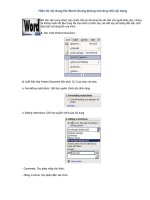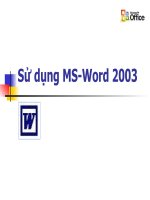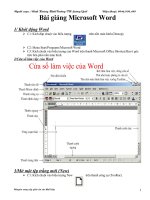Word Order
Bạn đang xem bản rút gọn của tài liệu. Xem và tải ngay bản đầy đủ của tài liệu tại đây (97.87 KB, 7 trang )
Word Order In Affirmative Sentences
1. Arrange the words to make affirmative sentences. Place time expressions at the end of the
sentences.
1. go / now / home / will / I →
2. give / the present / tomorrow / we / him / will →
3. her / met / last night / at / we / the station →
4. was / last week / he / in hospital →
5. in Greece / spend / I / will / next year / my holiday →
6. must / at five o'clock / leave / we / the house →
7. the library / take / I / the book / will / today / to →
8. my mum / breakfast / in the morning / made →
9. tonight / want / to the cinema / to go / we →
10. wrote / last week / they / at school / a test →
ANSWER KEY
1. I will go home now.
2. We will give him the present tomorrow.
3. We met her at the station last night.
4. He was in hospital last week.
5. I will spend my holiday in Greece next year.
6. We must leave the house at five o'clock.
7. I will take the book to the library today.
8. My mum made breakfast in the morning.
9. We want to go to the cinema tonight.
10. They wrote a test at school last week.
2. Arrange the words to make affirmative sentences.
like / I / you →
French / I / speak →
hates / pigeons / he →
they / song / a / sing →
sell / flowers / we →
you / see / me / can →
buy / milk / he / wants to →
feed / you / my / cat / can →
sister / has / my / got / a dog →
must / the book / read / you →
ANSWER KEY
like / I / you → I like you.
French / I / speak → I speak French.
hates / pigeons / he → He hates pigeons.
they / song / a / sing → They sing a song.
sell / flowers / we → We sell flowers.
you / see / me / can → You can see me.
buy / milk / he / wants to → He wants to buy milk.
feed / you / my / cat / can → You can feed my cat.
sister / has / my / got / a dog → My sister has got a dog.
must / the book / read / you → You must read the book.
3. Arrange the words to make negative sentences. Place time expressions at the end of the
sentences.
our holiday / will / at home / we / not / spend / next year
Page 1
→
did / I / him / see / not / last night / at the disco
→
to a party / not / we / tonight / going / are
→
will / a letter / not / next week / send / you / she
→
not / the truth / did / he / tell / you
→
to the cinema / we / want / not / do / tonight / to go
→
play / in the bar / did / he / last week / not / the piano
→
not / now / she / in England / is
→
eat / in winter / ice-cream / do / not / I
→
right now / have / not / we / time / do
→
ANSWER KEY
our holiday / will / at home / we / not / spend / next year
→ We will not spend our holiday at home next year.
did / I / him / see / not / last night / at the disco
→ I did not see him at the disco last night.
to a party / not / we / tonight / going / are
→ We are not going to a party tonight.
will / a letter / not / next week / send / you / she
→ She will not send you a letter next week.
not / the truth / did / he / tell / you
→ He did not tell you the truth.
to the cinema / we / want / not / do / tonight / to go
→ We do not want to go to the cinema tonight.
play / in the bar / did / he / last week / not / the piano
→ He did not play the piano in the bar last week.
not / now / she / in England / is
→ She is not in England now.
eat / in winter / ice-cream / do / not / I
→ I do not eat ice-cream in winter.
right now / have / not / we / time / do
→ We do not have time right now.
Complete the sentences with the words in brackets. Place time expressions at the end of the sentences.
She is in great form because (every week / goes / she / to the gym)
I think (likes / Susan / you)
I can't talk to you because (time / do not have / I / now)
We are glad that (at home / did not leave / we / our umbrella
I will miss him when (to Chicago / moves / he)
They don't know where (have left / the key / they)
Ring me if (have / you / a problem)
I'd like to know why (her holiday / does not spend / she / in France
They told him that (wanted to play / they / tennis)
He was reading the paper while (she / in the garden / was working)
ANSWER KEY
She is in great form because she goes to the gym every week .
I think (likes / Susan / you) .
Page 2
I can't talk to you because (time / do not have / I / now) .
We are glad that (at home / did not leave / we / our umbrella .
I will miss him when (to Chicago / moves / he) .
They don't know where (have left / the key / they) .
Ring me if (have / you / a problem) .
I'd like to know why (her holiday / does not spend / she / in France .
They told him that (wanted to play / they / tennis) .
He was reading the paper while (she / in the garden / was working)
Position of Time Expressions
Decide where to place the time expressions. (The sentences are similar to allow you to concentrate
on the time expressions.)
We went to the cinema yesterday.
We went yesterday to the cinema.
Both sentences are correct.
We often go to the cinema.
We go often to the cinema.
Both sentences are correct.
Next Tuesday I will go to the cinema.
I will go to the cinema next Tuesday.
Both sentences are correct.
They never go to the cinema.
They go to the cinema never.
Both sentences are correct.
She goes every Sunday to the cinema.
She goes to the cinema every Sunday.
Both sentences are correct.
I seldom am at the cinema.
I am seldom at the cinema.
Both sentences are correct.
I don't go to the cinema every week.
I don't go every week to the cinema.
Both sentences are correct.
Francis does not always go to the cinema.
Francis does not go to the cinema always.
Both sentences are correct.
Do frequently you go to the cinema?
Do you frequently go to the cinema?
Both sentences are correct.
My friends didn't go to the cinema on Friday.
On Friday my friends didn't go to the cinema.
Both sentences are correct.
ANSWER KEY
1. We went to the cinema yesterday.
2. We often go to the cinema.
3. Both sentences are correct.
4. They never go to the cinema.
5. She goes to the cinema every Sunday.
6. I am seldom at the cinema.
7. I don't go to the cinema every week.
8. Francis does not always go to the cinema.
9. Do you frequently go to the cinema?
10. Both sentences are correct.
Questions 1
Page 3
Arrange the words to make questions.
do / a dog / you / have →
you / coffee / do / like →
speak/ she / English / does →
he / can / dance -
play / at / you / the weekends / do / tennis →
go / last night / out / you / did →
the train / when / leave / does →
him / she / did / the truth / tell / why →
on / they / holiday / are →
she / Australia / from / is →
KEY
do / a dog / you / have → Do you have a dog?
you / coffee / do / like → Do you like coffee?
speak/ she / English / does → Does she speak English?
he / can / dance - Can he dance?
play / at / you / the weekends / do / tennis → Do you play tennis at the weekends?
go / last night / out / you / did → Did you go out last night?
the train / when / leave / does → When does the train leave?
him / she / did / the truth / tell / why → Why did she tell him the truth?
on / they / holiday / are → Are they on holiday?
she / Australia / from / is → Is she from Australia?
Questions 2
Ask for the subject (in bold print). Use 'who' (for people) or 'what' (for everything else).
Gareth speaks English. →
Mandy plays the guitar. →
John is from Australia. →
Our room is on the second floor. →
You will meet them next week. →
My bike is blue. →
The show started early. →
My computer doesn't work. →
Her brother went to Canada last year. →
Your friends don't like pizza. →
KEY
Gareth speaks English. → Who speaks English?
Mandy plays the guitar. → Who plays the guitar?
John is from Australia. → Who is from Australia?
Our room is on the second floor. → What is on the second floor?
You will meet them next week. → Who will meet them next week?
My bike is blue. → What is blue?
The show started early. → What started early?
My computer doesn't work. → What doesn't work?
Her brother went to Canada last year. → Who went to Canada last year?
Your friends don't like pizza. → Who doesn't like pizza?
Adverbs of Manner
Rewrite the sentences and put the adverbs in correctly.
She speaks. (slowly) →
They sang. (wonderfully) →
He treated her. (respectfully) →
John speaks English. (well) →
Page 4
The dog barks. (loudly) →
My sister plays the piano. (awfully) →
She met him. (secretly) →
The children laughed. (happily) →
She hurt her leg. (badly) →
They sneaked out of the house (quietly). →
KEY
She speaks. (slowly) → She speaks slowly.
They sang. (wonderfully) → They sang wonderfully.
He treated her. (respectfully) → He treated her respectfully.
John speaks English. (well) → John speaks English well.
The dog barks. (loudly) → The dog barks loudly.
My sister plays the piano. (awfully) → My sister plays the piano awfully.
She met him. (secretly) → She met him secretly.
The children laughed. (happily) → The children laughed happily.
She hurt her leg. (badly) → She hurt her leg badly.
They sneaked out of the house (quietly). → They sneaked out of the house quietly.
Adverbs of Place
Make sentences and put the adverbs (in italic print) in correctly (behind the verb or object).
is / over there / the cinema -
inside / go / let's -
the kitchen / downstairs / is -
playing / the kids / are / outside -
she / not / been / here / has -
the bathroom / is / upstairs -
were / everywhere / we / for / looking / you -
we / anywhere / you / find / couldn't -
? / there / a post office / nearby / is -
must / we / walk / back home –
KEY
is / over there / the cinema - The cinema is over there.
inside / go / let's - Let's go inside.
the kitchen / downstairs / is - The kitchen is downstairs.
playing / the kids / are / outside - The kids are playing outside.
she / not / been / here / has - She has not been here.
the bathroom / is / upstairs - The bathroom is upstairs.
were / everywhere / we / for / looking / you - We were looking for you everywhere.
we / anywhere / you / find / couldn't - We couldn't find you anywhere.
? / there / a post office / nearby / is - Is there a post office nearby?
must / we / walk / back home - We must walk back home.
Adverbs of Time
Arrange the words to make sentences. Place time expressions at the end of the sentence.
haven't / recently / seen / I / him -
I'll / you / see / soon -
afterwards / met / at the pub / him / we -
help / immediately / I / need -
was / arrogant / he / then / very -
? / now / are / where / you -
? / to go / where / you / do / want / today -
? / do / yesterday / did / you / what -
as soon as possible / you / him / the truth / tell / should -
Page 5









